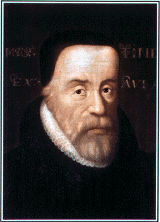
William Tyndale

William Tyndale
Literature of the sacred by definition could encompass quite a bit. Our text does a fairly good job giving us a sample of translations and writings that were published in the 16th century. Of course, choices were made so that not all texts are completely represented. For our discussions, perhaps we might look at additional texts that demonstrate the issues of translating the Latin (and Hebrew and Greek) into English--a radical idea in its time:
I Corinthians 13: 4 - 7, 11 - 13 (New Revised Standard Version, first published in 1989):
4 Love is patient; love is kind; love is not envious or boastful or arrogant 5 or rude. It does not insist on its own way; it is not irritable or resentful; 6 it does not rejoice in wrongdoing, but rejoices in the truth. 7 It bears all things, believes all things, hopes all things, endures all things.
11 When I was a child, I spoke like a child, I thought like a child, I reasoned like a child; when I became an adult, I put an end to childish ways. 12 For now we see in a mirror, dimly, but then we will see face to face. Now I know only in part; then I will know fully, even as I have been fully known. 13 And now faith, hope, and love abide, these three; and the greatest of these is love.
Good News Bible (1966) version of the same passages:
Love is patient and kind; it is not jealous or conceited or proud; 5 love is not ill-mannered or selfish or irritable; love does not keep a record of wrongs; 6 love is not happy with evil, but is happy with the truth. 7 Love never gives up; and its faith, hope, and patience never fail.
11 When I was a child, my speech, feelings, and thinking were all those of a child; now that I am an adult, I have no more use for childish ways. 12 What we see now is like a dim image in a mirror; then we shall see face-to-face. What I know now is only partial; then it will be complete--as complete as God's knowledge of me. 13 Meanwhile these three remain: faith, hope, and love; and the greatest of these is love.